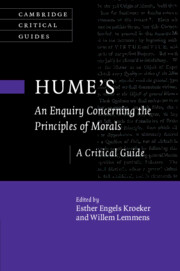Book contents
- Hume’s An Enquiry Concerning the Principles of Morals
- Cambridge Critical Guides
- Hume’s An Enquiry Concerning the Principles of Morals
- Copyright page
- Contents
- Contributors
- Acknowledgments
- Abbreviations
- Introduction
- Chapter 1 The Nature of Morals Founded on the Human Fabric
- Chapter 2 The Pride of Pericles
- Chapter 3 Justice and Politics in the Enquiry Concerning the Principles of Morals
- Chapter 4 History, Context, and the Conventions of Political Society
- Chapter 5 “Why Utility Pleases”
- Chapter 6 Hume on Talents and Moral Virtues
- Chapter 7 Virtues Suspect and Sublime
- Chapter 8 Sympathy and the Sources of Moral Sentiment
- Chapter 9 Virtue and Moral Psychology in the Enquiry Concerning the Principles of Morals
- Chapter 10 Hume, Cicero, and the Ancients
- Chapter 11 Hume on Religion in the Enquiry Concerning the Principles of Morals
- Chapter 12 Moral Disagreement
- Bibliography
- Index
- Cambridge Critical Guides
Chapter 2 - The Pride of Pericles
Hume on Self-Love, Benevolence, and the Enjoyment of Our Humanity
Published online by Cambridge University Press: 08 January 2021
- Hume’s An Enquiry Concerning the Principles of Morals
- Cambridge Critical Guides
- Hume’s An Enquiry Concerning the Principles of Morals
- Copyright page
- Contents
- Contributors
- Acknowledgments
- Abbreviations
- Introduction
- Chapter 1 The Nature of Morals Founded on the Human Fabric
- Chapter 2 The Pride of Pericles
- Chapter 3 Justice and Politics in the Enquiry Concerning the Principles of Morals
- Chapter 4 History, Context, and the Conventions of Political Society
- Chapter 5 “Why Utility Pleases”
- Chapter 6 Hume on Talents and Moral Virtues
- Chapter 7 Virtues Suspect and Sublime
- Chapter 8 Sympathy and the Sources of Moral Sentiment
- Chapter 9 Virtue and Moral Psychology in the Enquiry Concerning the Principles of Morals
- Chapter 10 Hume, Cicero, and the Ancients
- Chapter 11 Hume on Religion in the Enquiry Concerning the Principles of Morals
- Chapter 12 Moral Disagreement
- Bibliography
- Index
- Cambridge Critical Guides
Summary
This chapter evaluates Hume’s positive account of benevolence in Section 2 and his critique of the selfish theories in Appendix 2 of the Enquiry Concerning the Principles of Morals. The chapter’s first part elucidates Hume’s definition of the concepts of benevolence and self-love and explains the difference between the sentiments of benevolence and humanity. In Hume’s view, this first part further highlights, the virtue of benevolence belongs to a class of social virtues distinct from justice. A second part focuses on the example of Pericles on his deathbed in Section 2 to illustrate Hume’s positive account of benevolence as well as the reductionist and skeptical suspicion of the selfish theories concerning benevolence and the social virtues. A third part offers a critical examination of Hume’s critique of the selfish theories and shows how Appendix 2 gives further evidence in favor of Hume’s nonreductionist account of benevolence and the social virtues. In the last part, focusing on the intriguing Section 9, some concluding reflections are offered on Hume’s avowal of the unorthodox character of his own benevolence-based moral theory and his appraisal of a modified self-love as constitutive of the flourishing of the sentiment of humanity.
- Type
- Chapter
- Information
- Hume's An Enquiry Concerning the Principles of MoralsA Critical Guide, pp. 33 - 52Publisher: Cambridge University PressPrint publication year: 2021

